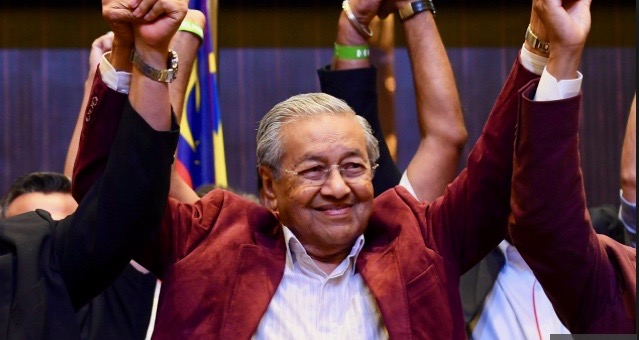TOM PLATE WRITES — The first thing that must be said to Dr Mahathir Mohamad and his Bersatu party for their stunning ejection of the greedy incumbent prime minister is simply this: Congratulations!
Sometimes politics is fiendishly complicated, but in this case it is not. The voters of the Republic of Malaysia have returned to power their former prime minister for 23 years who stepped down voluntarily in 2003, laying claim as the longest-running PM in the history of his economically developing Southeast Asian secular authoritarian democracy.
Who is Dr Mahathir Mohamad? He is easily one of the smartest political leaders I have interviewed. He spent very good time with me after he left office in a series of long chats that led to the book ‘Conversations with Mahathir Mohamad’ (2011). The book was denounced at the time as too “soft” on this strong-willed man, but we now see – 17 years later – that Malaysians wanted him back, hard or soft, flawed as he might be – they know he was the best PM they had had and needed his skills back at the top.
Why? Let me put it this way. In my career work as an American journalist, I have been extremely fortunate to have had considerable access to a good number of leading political figures, as it were. This collection includes a geographically wide span, from British PM John Major and Tony Blair, to Japanese prime ministers and to the three subjects of the ‘Giants of Asia’ books: former UN Secretary General and South Korean Foreign Minister Ban Ki-moon; wrongly ousted Thai PM Thaksin Shinawatra, and – last but certainly not least — Lee Kuan Yew, the political genius who founded and ran for 31 years the remarkable city-state of Singapore.
Mahathir has absolutely no need to retreat to the back of any bus seating these passengers. To my mind, he was a moderate (but he hated this adjective) Muslim Machiavellian (that, he thought a fair phrase). After the American tragedy of Sept. 1, 2001, U.S. officials beat a jet path to Kuala Lumpur to sit at the feet of this master to learn how his government had been going about the proper business of keeping Malaysia secular – and extremists neutralized. If there were to be an icon for the adjective ‘wily’, that would be ‘Mahathir’.
I found him easy to talk to, pleasant and witty, and more or less dumbfounded that any American journalist would bother for more than 15 minutes with a man from mere Malaysia. Down to his south on the Malay Peninsula, after all, was Singapore, then bejeweled with the crown prince of political articulation: Lee Kuan Yew. Who could compete with that extraordinary man who led the region in creating and maintaining quality government, though barely abiding opposing views?
What’s more, I had just finished the first volume in the ‘Giants of Asia’ series, the one on Lee Kuan Yew, who had always been generous to me with his time. So I had been properly pre-dazzled. But Dr M, in his own droll way, was dazzling too. In media interviews after the second book appeared, about Dr M, I was often asked: Who do you think is smarter? Better? Etc.
To be fair to both great leaders, each possessing quite remarkable qualities, I could not answer that question. So I didn’t. And I won’t, even today. For all sorts of reasons, I thought both were as smart and as sharp as any Western – or Eastern- leader I had ever interviewed.
The abused and jailed Anwar Ibrahim, soon to be released as a result of this amazing election, will succeed Dr M before too long. But no one will ever exceed the almost miraculous political resurrection of Mahathir. Oh, one other thing: you know that infamous ‘aging crisis” in Asia? All these useless old people, etc etc. Dr M is 92.
Professor Tom Plate, author of ‘Yo-Yo Diplomacy’ and the ‘Giants of Asia’ series, is Loyola Marymount University’s Distinguished Scholar of Asian and Pacific Affairs, a South China Morning Post columnist and Pacific Century Institute vice president.

